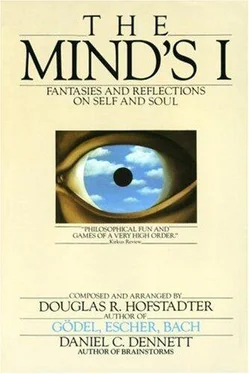If simulation is such a good idea, we might expect that survival machines would have discovered it first. After all, they invented many of the other techniques of human engineering long before we came on the scene: the focusing lens and the parabolic reflector, frequency analysis of sound waves, servo-control, sonar, buffer storage of incoming information, and countless others with long names, whose details don’t matter. What about simulation? Well, when you yourself have a difficult decision to make involving unknown quantities in the future, you do go in for a form of simulation. You imagine what would happen if you did each of the alternatives open to you. You set up a model in your head, not of everything in the world, but of the restricted set of entities which you think may be relevant. You may see them vividly in your mind’s eye, or you may see and manipulate stylized abstractions of them. In either case it is unlikely that somewhere laid out in your brain is an actual spatial model of the events you are imagining. But, just as in the computer, the details of how your brain represents its model of the world are less important than the fact that it is able to use it to predict possible events. Survival machines which can simulate the future are one jump ahead of survival machines who can only learn on the basis of overt trial and error. The trouble with overt trial is that it takes time and energy. The trouble with overt error is that it is often fatal. Simulation is both safer and faster.
The evolution of the capacity to simulate seems to have culminated in subjective consciousness. Why this should have happened is, to me, the most profound mystery facing modern biology. There is no reason to suppose that electronic computers are conscious when they simulate, although we have to admit that in the future they may become so. Perhaps consciousness arises when the brain’s simulation of the world becomes so complete that it must include a model of itself. Obviously the limbs and body of a survival machine must constitute an important part of its simulated world; presumably for the same kind of reason, the simulation itself could be regarded as part of the world to be simulated. Another word for this might indeed be “self-awareness,” but I don’t find this a fully satisfying explanation of the evolution of consciousness, and this is only partly because it involves an infinite regress—if there is a model of the model, why not a model of the model of the model? …
Whatever the philosophical problems raised by consciousness, for the purpose of this story it can be thought of as the culmination of an evolutionary trend towards the emancipation of survival machines as executive decision-takers from their ultimate masters, the genes. Not only are brains in charge of the day-to-day running of survival-machine affairs, they have also acquired the ability to predict the future and act accordingly. They even have the power to rebel against the dictates of the genes, for instance in refusing to have as many children as they are able to. But in this respect man is a very special case, as we shall see.
What has all this to do with altruism and selfishness? I am trying to build up the idea that animal behavior, altruistic or selfish, is under the control of genes in only an indirect, but still very powerful, sense. By dictating the way survival machines and their nervous systems are built, genes exert ultimate power over behavior. But the moment-to-moment decisions about what to do next are taken by the nervous system. Genes are the primary policy-makers; brains are the executives. But as brains became more highly developed, they took over more and more of the actual policy decisions, using tricks like learning and simulation in doing so. The logical conclusion to this trend, not yet reached in any species, would be for the genes to give the survival machine a single overall policy instruction: do whatever you think best to keep us alive.
Selfish Memes
The laws of physics are supposed to be true all over the accessible universe. Are there any principles of biology which are likely to have similar universal validity? When astronauts voyage to distant planets and look for life, they can expect to find creatures too strange and unearthly for us to imagine. But is there anything which must be true of all life, wherever it is found, and whatever the basis of its chemistry? If forms of life exist whose chemistry is based on silicon rather than carbon, or ammonia rather than water, if creatures are discovered which boil to death at −100 degrees centigrade, if a form of life is found which is not based on chemistry at all but on electronic reverberating circuits, will there still be any general principle which is true of all life? Obviously I do not know but, if I had to bet, I would put my money on one fundamental principle. This is the law that all life evolves by the differential survival of replicating entities. The gene, the DNA molecule, happens to be the replicating entity which prevails on our own planet. There may be others. If there are, provided certain other conditions are met, they will almost inevitably tend to become the basis for an evolutionary process.
But do we have to go to distant worlds to find other kinds of replicator and other, consequent, kinds of evolution? I think that a new kind of replicator has recently emerged on this very planet. It is staring us in the face. It is still in its infancy, still drifting clumsily about in its primeval soup, but already it is achieving evolutionary change at a rate which leaves the old gene panting far behind.
The new soup is the soup of human culture. We need a name for the new replicator, a noun which conveys the idea of a unit of cultural transmission, or a unit of imitation. “Mimeme” comes from a suitable Greek root, but I want a monosyllable that sounds a bit like “gene.” I hope my classicist friends will forgive me if I abbreviate mimeme to meme. If it is any consolation, it could alternatively be thought of as being related to “memory,” or to the French word même. It should be pronounced to rhyme with “cream.”
Examples of memes are tunes, ideas, catch-phrases, clothes fashions, ways of making pots or of building arches. Just as genes propagate themselves in the gene pool by leaping from body to body via sperms or eggs, so memes propagate themselves in the meme pool by leaping from brain to brain via a process which, in the broad sense, can be called imitation. If a scientist hears, or reads about, a good idea, he passes it on to his colleagues and students. He mentions it in his articles and his lectures. If the idea catches on, it can be said to propagate itself, spreading from brain to brain. As my colleague N. K. Humphrey neatly summed up an earlier draft of this chapter: “… memes should be regarded as living structures, not just metaphorically but technically. When you plant a fertile meme in my mind, you literally parasitize my brain, turning it into a vehicle for the meme’s propagation in just the way that a virus may parasitize the genetic mechanism of a host cell. And this isn’t just a way of talking—the meme for, say, ‘belief in life after death’ is actually realized physically, millions of times over, as a structure in the nervous systems of individual men the world over.”
* * *
I conjecture that co-adapted meme-complexes evolve in the same kind of way as co-adapted gene-complexes. Selection favours memes which exploit their cultural environment to their own advantage. This cultural environment consists of other memes which are also being selected. The meme pool therefore comes to have the attributes of an evolutionarily stable set, which new memes find it hard to invade.
I have been a bit negative about memes, but they have their cheerful side as well. When we die there are two things we can leave behind us: genes and memes. We were built as gene machines, created to pass on our genes. But that aspect of us will be forgotten in three generations. Your child, even your grandchild, may bear a resemblance to you, perhaps in facial features, in a talent for music, in the colour of her hair. But as each generation passes, the contribution of your genes is halved. It does not take long to reach negligible proportions. Our genes may be immortal but the collection of genes which is any one of us is bound to crumble away. Elizabeth II is a direct descendant of William the Conqueror. Yet it is quite probable that she bears not a single one of the old king’s genes. We should not seek immortality in reproduction.
Читать дальше











